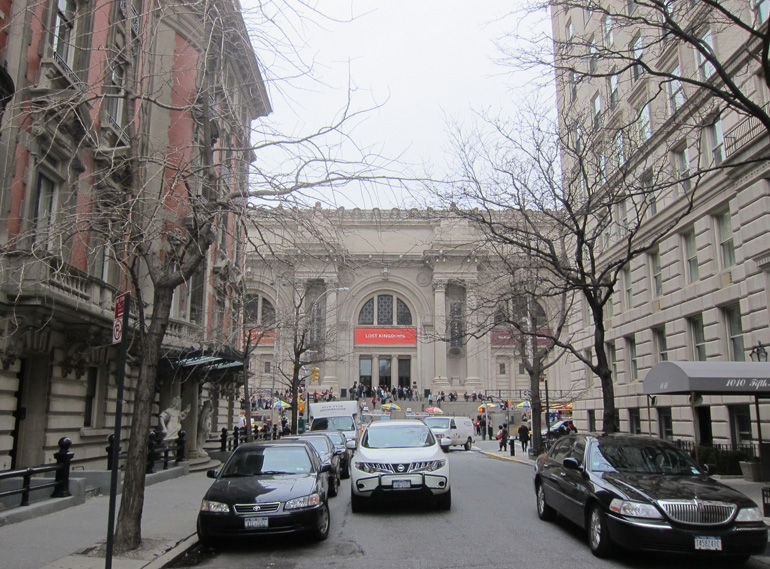Gotham Diary:
The Prowst Problem, cont’d
8 April 2014
Speechless!
Well, I say that, but of course I never am.
Frank Bruni writes about a class that he is teaching at Princeton — he doesn’t say what he is teaching, and he doesn’t specify “Princeton University,” so perhaps this is just a test-cramming course on the Upper West Side.
Last week I mentioned the movie “They Shoot Horses, Don’t They?” Only one of the 16 students had heard of it. I summarized its significance, riffling through the Depression, with which they were familiar, and Jane Fonda’s career, with which they weren’t. “Barbarella” went sailing over their heads. I didn’t dare test my luck with talk of leg warmers and Ted Turner.
I once brought up Vanessa Redgrave. Blank stares. Greta Garbo. Ditto. We were a few minutes into a discussion of an essay that repeatedly invoked Proust’s madeleine when I realized that almost none of the students understood what the madeleine signified or, for that matter, who this Proust fellow was.
Oops! I was wrong. He does specify Princeton University.
Can anybody tell me what Princeton University is for, if it accepts students who know so little of the world into which they were born — who seem to know almost nothing that happened before they were born? This would appear to put Princeton in the position of a high school — and not a very good one.
I don’t blame the students. I look at Mr Bruni and his colleagues, because it’s they who are the problem. Confronted by minds deprived of perspective, not so much by the “plethora” of “media choices” as by a shocking want of juvenile discipline, they throw up their hands.
I brought up this Balkanization of experience with Hendrik Hartog, the director of the American studies program at Princeton, and he noted that what’s happening in popular culture mirrors what has transpired at many elite universities, where survey courses in literature and history have given way to meditations on more focused themes.
“There’s enormous weight given to specialized knowledge,” he said. “It leaves an absence of connective tissue for students.” Not for nothing, he observed, does his Princeton colleague Daniel Rodgers, an emeritus professor of history, call this the “age of fracture.”
“The Age of Fracture” sounds like a problem. I can think of only one solution. (American Studies, indeed!) It’s called History.
History is not just the names and dates of battles, kings, empires, and all that. It is far more dense. The masterpieces of art that are housed in our museums make full sense only when their roots in particular times and places are grasped as the springboard of their timeless universality.
The whole point of the United States of America, its very reason for being, cannot be comprehended without a familiarity with the history of classical antiquity (“Greece and Rome”), together with everything in between. Most of modern literature, from the Eighteenth Century on, is incomprehensible without a solid understanding of the rise of the bourgeoisie.
(You might say that our current muddle owes to the triumph of the bourgeoisie, a class with its sights fixed ever upward. Now there is no one to look up to.)
Capitalism has a history. It’s important to know that all the social sciences have been deformed, from their inception, by “physics envy,” the urge to find invariable laws in human behavior. Economics is arguably the most deformed of the social sciences — don’t be fooled by the veneer of mathematics!
History is nothing but The World So Far, and it is all that. Nobody can be expected to know very much of it in detail, but the outlines are assimilable, and a well-educated mind is a mind that is able to relate, roughly, any two pieces of information about it, and to relate what happened to what’s happening. Think of history not as an avalanche of facts but rather as a tree. This tree grows in the mind, with the mind, but it does not produce its own foliage. Leaves are furnished by familiarity with The World. The well-educated mind knows, as I say, where to put what it knows on this tree, and the more knowledge that’s arranged on any part of the tree, the bigger it grows.
The English language has a history. It used to be quite different. Chaucer’s verse is no longer intelligible to untrained listeners. Shakespeare becomes more difficult every decade. The point of university education is to cultivate a class of students (ideally, all young men and women) who are made familiar with History at a time when their minds are developing. Let me put it another way: university education has no other point. The familiarization with History is supposed to occur at the high-school level. Why isn’t Princeton insisting on properly educated students — instead of looking for “well-rounded” achievers? A lot of good “meditations on more focused themes” are going to do terminally myopic students!
Why are the people in education walking away from their jobs — but not their paychecks?
Remembering the daunting Regents Exams that were so feared in my day, I turn to Wikipedia and find the following depressing tidbit:
In April 2012 the Board of Regents decided to formally consider a proposal that would eliminate Regents Examination in Global History and Geography as a graduation requirement for some students beginning September 2013. Global History and Geography is the most frequently failed examination.
That’s just great. If students fail examinations, drop the course. The one course that really matters.
Whatever happened to teachers?
Perhaps Mr Bruni doesn’t see the importance of the problem. After all, he titles his column, “The Water Cooler Runs Dry” — a frivolous reduction of higher education to the dimensions of mass entertainment.
Now I really am speechless.

